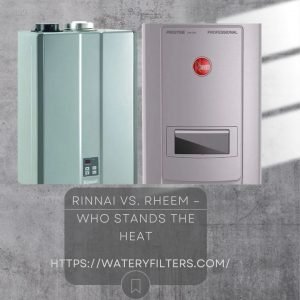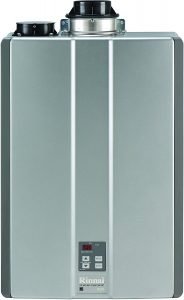Table of Contents

After hearing so much about tankless water heaters, you’ve finally decided to go with one. The energy savings, never-ending hot water, and small size all appeal to me. However, you can’t choose between Rinnai and Rheem , the two top brands. You can’t go wrong with either, but after weighing the pros and cons in a Rinnai vs Rheem comparison, I personally believe one of these water heaters is the superior overall choice.
Rheem vs. Rinnai – Comparison
Both of these brands are market leaders in tankless water heaters. They both provide beautiful engineering, excellent energy efficiency, and technological advancements in tankless systems.
When you read bad reviews about any of the models that either company produces, you’ll see that the majority of them were posted by customers who didn’t completely examine their needs and ended up purchasing the incorrect device.
Both of these water heater versions meet the water needs of a residence with a household of five or more people. With over 10 GPM, you may run many fixtures at once without experiencing any water flow slowdown.
Rinnai water heater
Key Features
Brand : Rinnai
Style: Indoor
Power Source: Wind Powered
Special Features
Innovative technology : With condensing technology, Rinnai takes tankless water heating to the next level, delivering higher efficiency than ever before.
Saves energy : Rinnai offers all of the tankless benefits you’ve come to expect, plus even more energy savings.
Features : Thermal Efficiency is 95%. Propane or natural gas installation in a building.
Temperature settings : The temperature ranges from 98 to 140 degrees Fahrenheit. Temperatures in the home range from 98 to 185 degrees Fahrenheit. Temperature Range for Commercial Use Separately, a commercial controller must be purchased.
BTUs Input Gas Rate : 15,200 – 199,000 electronic ignition meets NOx emissions standards in California and Texas Rinnai digital controllers are compatible with the entire line of Rinnai digital controllers.
Warranty : Heat exchangers have a 12-year warranty, parts have a 5-year warranty, and labour has a 1-year warranty for residential installations.
Specifications : Weight: 61.7 lbs. Width: 18.5″ Height: 26″ Depth: 10″ 3/4″ gas connection with 3/4″ water connection.
Pros
- Wifi capability
- 12 year warranty
Cons
- None
Rheem water heater
Key Features
Brand : Reheem
Material: Stainless Steel, Polyvinyl Chloride
Power Source: Gas Powered
Special Features
Saves Energy: Because it only heats water when you need it, it uses less energy than a tank-type water heater and emits less greenhouse gases, making it a more sustainable option. All Rheem tankless gas models regulate the amount of energy needed to heat the water you require automatically. This modified technique improves efficiency while lowering energy usage.
Saves Money: Compared to a traditional 50-gallon gas tank-type water heater, these tankless water heaters can save you money on operating costs by consuming less energy.
Water saviour: Our tankless gas water heaters have a water savings setting as part of Rheem’s commitment to sustainability. Water waste is decreased by up to 1,100 gallons per year, when this setting is activated.
Compact design: Indoor condensing tankless gas water heaters from Rheem are tiny and compact, which saves you space in your home. In compact locations, such as a utility closet, attic, or storage room, they can simply be wall-mounted.
Constant hot water: Rheem tankless gas water heaters give continuous hot water, so you’ll never run out, even if you’re taking multiple showers in a row.
Improves air: Rheem uses emission reduction technologies to improve air quality. In all 50 states, all models meet or exceed severe federal regulations.
Convenient Control: Rheem’s tankless remote electronic thermostat provides for easy temperature adjustment in two-degree increments between 85°F and 140°F. By pressing the power button, the machine can be turned on or off. Furthermore, anytime service or maintenance is required, thorough diagnostics are digitally shown.
Pros
- Condensate neutraliser
- Self-diagnostic system
Cons
- Poor customer service
Why Rinnai is better?
You won’t find a better brand of tankless water heaters for efficiency, capacity, or performance. Yes, they are more expensive than other manufacturers in the same class, but you get more features and solid technology. You’ll appreciate the Wifi if you want gadgets like being able to connect to Alexa and having maintenance warnings sent directly to your phone.
Other features, such as the already-integrated recirculation pump, can be added. You get the most Gallons Per Minute (GPM) than any other brand, so whether you live in a cold climate or have a large family with a high water demand, a Rinnai water heater is an absolute must.
Buying Guide
That was an overview of the differences between Rinnai and Rheem water heaters. However, at the end of the day, you must assess your specific requirements. Here are some things to think about before deciding which unit to buy:
Demand for water : You must determine how much water you consume at any one time because a tankless water heater does not store any water. Gallons Per Minute (GPM) is the abbreviation for this figure. It’s not difficult to figure out, but I’ve included a handy chart below that will show you the average GPM of your household water fittings. When you have numerous fixtures running at the same time, take a few days to write them down. Check to see if this is a one-time event or if you require these fixtures to run at the same time on a regular basis. It makes no difference whether you use 100 gallons of water every day. The only thing that matters is how much you use at once. Once you have that number, you can figure out what size tankless water heater you’ll need based on your GPM.
Indoors or out : When it comes to installing a tankless water heater, you have a lot of options. Because they take up so little room, they provide significant space savings. You can even choose between an indoor and an outdoor model to expand your options even more. Because you can’t just put an indoor model outside, you need to think about where you’d like to install your on-demand water heater. There are numerous advantages to using an outdoor tankless water heater, but you must reside in a region of the country where freezing weather is rare. Though many outside tankless water heaters offer freeze protection, if the weather is persistently chilly where you live, you may want to consider an inside tankless water heater, as this will have an impact on how efficient your unit is.
Fuel Source : For many people, this will not be an issue because they can heat their water with natural gas, propane, or electricity. Others may be restricted in some way. Because some older houses have short gas lines that aren’t compatible with a tankless water heater, the age of your home can also influence which model you can choose. This increases the cost of installation and can cancel out any cost savings realised by converting from a tank system to a tankless system.


